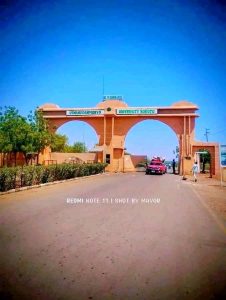By Alqasim Gbemisola

Raheenah Jimoh had never ventured beyond the borders of her hometown, Shaki, in Oyo State. For as long as she could remember, the southwestern landscape of Nigeria, with its familiar climate, was all she knew. Tales of the harsh, unforgiving weather of the northwestern region were just that – tales.
But in 2024, her world expanded dramatically when she received an offer to study Botany at Usmanu Danfodiyo University in Sokoto.
To her, the reality of Sokoto’s extreme conditions, so unlike her home, awaited her as she embarked on this new academic journey.
“The weather in Sokoto is not friendly,” she said with a stressed face.“During my first Ramadan on this campus, I almost broke some fasts because the weather was not bringing comfort then.”
Sokoto state is known for its hot, arid climate, which is often exacerbated by the impact of climate change. Research shows that climate change can significantly affect the seasonal variations of temperatures and precipitation, resulting in altered heat seasons and potentially devastating consequences.
In many regions around the world, climate change has led to more frequent and more intense heat waves, creating longer, hotter heat seasons. This, in turn, has caused an increase in the number of heat-related illnesses and deaths, especially among vulnerable populations such as the elderly, infants, and those with chronic conditions.
“I consider some lectures as free day” – Raheenah
Whenever a lecture is scheduled for the afternoon, when the relentless and fierce sun in Sokoto hits both living and nonliving alikes, Raheenah opts to skip some lectures.
“Attending a lecture is the most frustrating part because when you get to class, everywhere will be hot like a microwave,” she bitterly expressed.
According to the World Weather Information Service, Sokoto has an average high temperature of around 40°C (104°F) during the hottest months (April to June). The temperature can reach up to 45°C (113°F) or more on the hottest days, which can cause discomfort and even serious health risks, particularly for people who are not used to extreme heat.
More ordeals
Not only Raheenah is facing the harshness of Sokoto weather, but Suleiman Rahmat, a newly admitted student of Pure Chemistry also bemoaned that the heat in Sokoto is both frustrating and devastating.
Stressing, she maintained that she used to sleep outside her hostel to avoid the unbearable heat. “I nearly contracted malaria due to mosquito bites while sleeping outside.”
Another student, Lawal Opeyemi, an indigene of Ibadan, Southwestern part of Nigeria exclaimed that the weather in Sokoto is quite different from her hometown.
“The sunlight is different and it affects me in a lot of ways. I am unable to read during the day and also during Ramadan, which has affected my academics,” she told this reporter.
Ishaq Aisha also expressed that the hot weather does weaken her body which sometimes leads to malaria.
“I have no other choice than to get used to it because when someone changes the environment, everything including the weather has to change,” she said.
